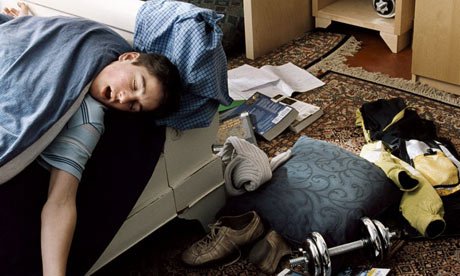Healthy kids – does your teen get enough sleep?

My teenager sleeps a lot. Should I be worried? Teenagers should get nine to 10 hours of sleep per night but, unfortunately, most do not. Demands of homework, work, family and friends often result in late nights. Sleep deprivation can result in difficulty with concentration and learning, irritability and daytime sleepiness.
Encourage your tween or teen to prepare for a good night’s sleep by having them avoid caffeine, unplug from electronic devices an hour before bed, engage in a calming activity before bed (such as reading or a warm bath) and minimize daytime napping. Participating in regular exercise and physical activity improves sleep quality and overall energy level.
A consistent sleep schedule and adequate sleep each night are important. With long school days and more activities, children are sometimes permitted to stay up much later and sleep later to compensate. While some flexibility is reasonable, efforts should be made to ensure that adequate sleep occurs each night.
A top predictor for obesity in small children is insufficient sleep (less than 10 hours per night). Inadequate sleep during the week cannot effectively be recovered on weekends. Also, a consistent sleep schedule throughout the year improves transitions and school performance
Guidelines for recommended sleep duration are provided by the American Academy of Sleep Medicine and the American Academy of Pediatrics. A consistent approach is the best choice. Brief exceptions are, of course, expected – but a quick and consistent return to routine is advisable.
To promote optimal health, children should sleep the following duration per 24 hours, based on age:
- 4-12 months: 12-16 hours (including naps)
- 1-2 years: 11-14 hours (including naps)
- 3-5 years: 10-13 hours (including naps)
- 6-12 years: 9-12 hours
- 13-18 years: 8-10 hours
Bedtime should ideally occur at the same time each night, and kids should awaken at the same time each morning. There should be no electronic distractions or activities in the bedroom. Stimulants such as caffeine should be avoided.
Good sleep habits encourage adequate restful sleep, which results in improved school performance, daytime function, attention and behavior, and decreases the risk of obesity and related problems.








Recent Comments